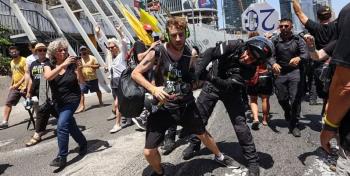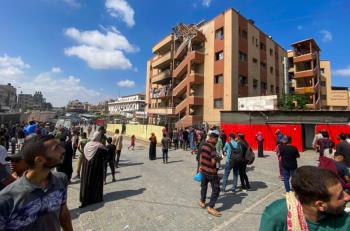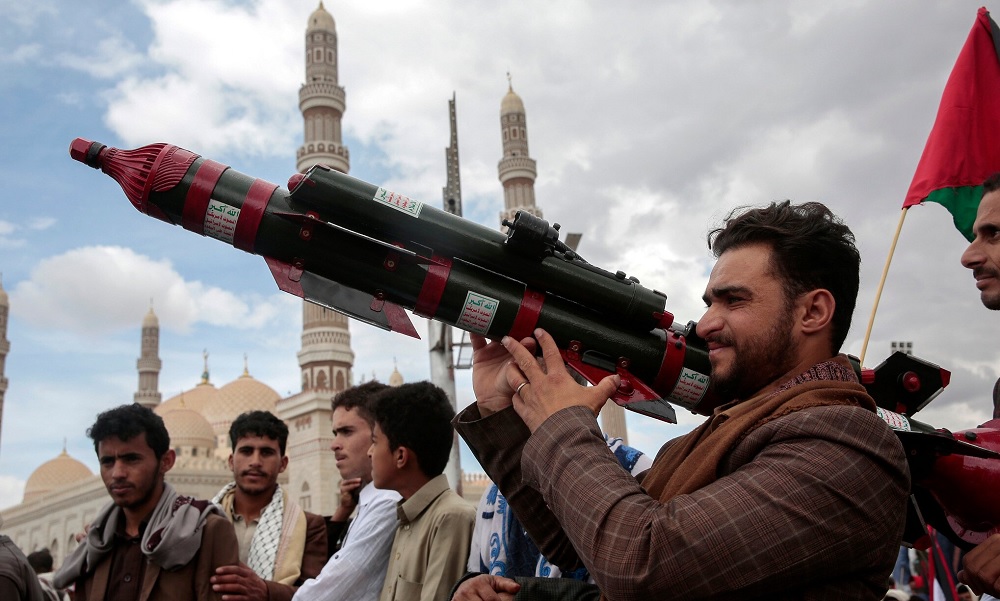Alwaght- Israeli and Yemeni officials have emphasized that the Israeli regime bombed the Yemeni capital Sana'a on Sunday. Yemen's Al-Masirah TV reported that the attack targeted oil facilities and a power station. Tel Aviv announced that its warplanes also attacked the presidential palace in a "military complex." Al-Masirah TV reported that at least 6 people were killed and 86 were injured.
The Israeli army has claimed that the recent attacks on the capital were carried out in response to repeated attacks by Yemeni forces.Al-Masirah TV reported, citing a Yemeni military official, that the Yemeni army’s air defenses were able to “counter most of the Israeli enemy aircraft that participated in the aggression and force them to leave the area.”
This is not the first time that the Israelis have claimed to bomb Yemen with the aim of stopping the missile attacks by the Yemeni forces that are carried out in solidarity with Gaza.Over the past 2 years, simultaneous with the Gaza war, the Israeli army has bombed ports, installations, and military equipment of the Yemeni army in at least more than 18 stages, but it seems that none of these bombings have been able to stop Yemen’s missile attacks on the occupied Palestinian territories and the Israelis are still helpless against the attacks by the Ansarullah Movement.
Futile attacks
After Israeli attacks on Sana'a,Ansarullah forces asserted that these attacks will not check their attacks on Israel. Mohammad al-Bukhaiti, an Ansarullah official, stated that the Israeli aggression "will not keep us from continuing our support to Gaza."
Also,Abed al-Thawr, a Yemeni defense ministry official, called the Israeli claims about striking military targets "lies", adding that the Israeli jets bombed civilian infrastructure to challenge the Yemenis. The Yemeni official told Al Jazeera that the presidential palace that was struck on Sunday was evacuated a long time ago and what Israel did was actually "barbarism."
For its part,Hamas condemned the Israeli attacks, labeling them a "blatant violation of Arab sovereignty and international laws."
Israel’s recent unsuccessful attacks on Sana'a are an example of Israel’s strategic failure in Yemen.These attacks are carried out symbolically against Yemeni civilians and civilian infrastructure, resulting in a humanitarian crisis for Yemeni citizens, but are of no avail militarily.
Rebuilding Sana'a power
Just since March 2025,over 70 missiles and 22 drones were fired at the occupied territories from Yemen, signaling that the Yemeni war machine is active despite Israeli bombing.
The Yemeni military has also targeted more than 100 commercial ships bound for Israel in the Red Sea since November 2023,namely a month after the Israeli war on Gaza started, causing insurance rates to skyrocket and imposing exorbitant costs on commercial Israeli-bound ships. The Yemeni attacks have also forced the port of Eilat, Israel’s key port on the Red Sea, to cut its operations by 90 percent, pushing it to the brink of bankruptcy. This situation is a sign that Israel’s bombing of Yemen has so far been fruitless.
Although the US initially joined Israel’s attacks on Yemen,it quickly realized the strategic quagmire in Yemen and soon avoided a costly war of attrition by declaring a ceasefire with Yemeni forces. The US’s $1 billion bombing campaign against Yemen was so ineffective that the Trump administration immediately accepted a ceasefire brokered by Oman.
According to the latest assessments,since the US halted attacks, Yemeni forces have rebuilt their radar systems, communications networks, and reconnaissance capabilities. They have also conducted naval exercises in the port of Hudaydah, deployed modern weapons in coastal areas of the Red Sea, and moved ammunition to the western mountainous areas.
Why are Israeli attacks on Yemen's electricity facilities fruitless?
Over the past months,the Israeli attacks have gone beyond targeting military aims in Yemen and struck vital civilian facilities like power plants. Hizyaz Power Station is one of the key facilities supplying power to Sana'a that was bombed last month, but the military activities of the Yemenis were not halted. The Israeli strategy of attacking civilian infrastructure indicates the miscalculation of Tel Aviv. Though harmful, these attacks are unlikely to leave a considerable impact on Yemen's capability to continue its military operations in support of Palestine.
Previously,during the Saudi-led coalition war against Yemen (2015-2023), Yemeni power plants were repeatedly attacked, motivating the Yemenis to turn to decentralized sources of electricity such as small solar installations, home generators, and diesel units. Therefore, the current Israeli attacks on power stations have little strategic impact on the Yemeni situation, as the type of energy supply in Yemen has become domestic and decentralized.
Winner of war of narratives
The firing of a ballistic missile from Yemen at Tel Aviv’s Ben-Gurion International Airport has unveiled the endless missile capacity of Yemen.Additionally, the Israeli attacks on Yemen's civilian infrastructure have strengthened the Yemeni resistance's narrative in the face of Israeli aggression and boost the regional legitimacy of the Ansarullah forces, while Israeli international isolation is growing.
Now Abdul Malik al-Houthi,the leader of Ansarullah, is an important and determining leader in the Axis of Resistance and his words reflect the strategies of the Hezbollah chief martyr Sayyed Hassan Nasrallah.
Al-Houthi has repeatedly criticized Arab rulers for their“shameful weakness” in yielding to US and Israeli pressure, while presenting Yemeni forces as brave forces in the face of Israeli aggression. Al-Houthi’s message is measured and highly effective in the region. By denouncing US demands to disarm Lebanon’s Hezbollah as a “betrayal of sovereignty,” deriding Egypt’s gas deals with Israel as a “tragic contradiction,” and accusing Arab leaders of remaining silent in the face of Netanyahu’s expansionist rhetoric of “Greater Israel,” he has managed to portray the Yemeni forces as the only deterrent on the Arabian Peninsula against Israeli military aggression. Each Israeli attack on Yemen, especially on civilian sites, actually boosts the leadership of Ansarullah over the Axis of Resistance and impairs the Israeli position, and at the same time establishes the influence of Ansarullah beyond Yemeni borders.
Meanwhile,Israel still turns a blind eye to the realities and remains unaware that military action does not settle the challenge posed by Yemen. History has given us clear lessons; from Hezbollah to Hamas and Ansarullah have not given in under bombardment, rather, they gain further legitimacy. In fact, the Israeli strategy in the region only promises deeper isolation and longer-term conflict.



























